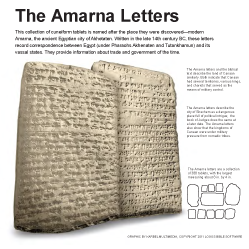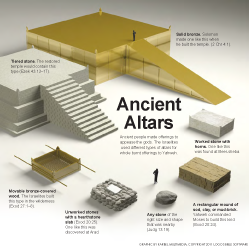33:1–20 As Esau approaches, Jacob divides his children among their respective mothers and then greets his brother with respect and deference (vv. 1–3). Despite Jacob’s concerns (see 32:6–8), Esau welcomes Jacob affectionately (vv. 4–7). Esau initially refuses Jacob’s gift, but he eventually yields to Jacob’s urging (vv. 8–11). Esau then encourages Jacob to return to Edom with him, but Jacob continues to Shechem (vv. 12–20). The chapter ends with Jacob following the pattern of Abraham and Isaac by erecting an altar to God (see v. 20 and note). |
33:1 he divided the children The earlier division (32:6–8) of his property was a tactical decision made on the presumption of Esau’s hostility. This act of division orders mothers with their own children for presentation to Esau. The wives are presented in ascending order of status. Note that the order is followed in vv. 5–7.
33:3 bowed down to the ground seven times The sevenfold prostration was used to express subordination to a superior.
The inclusion of this detail by the narrator points to the irony of the situation: lordship and the prostration of his brother’s sons were part of the blessing Jacob stole from Esau (27:29).
33:4 and kissed him The Hebrew scribes copying the traditional text may have been suspicious of the sincerity of Esau’s kiss since they marked the verb form with small dots above the words. This is a known scribal device used to draw attention to something unusual. The narrative, however, does not contain anything that suggests Esau was insincere.
33:5 your servant Jacob continues to address himself as Esau’s subordinate (compare “servant” in v. 14 and “my lord” vv. 8, 13–15). Esau, on the other hand, uses “my brother” in v. 9.
33:8 company The Hebrew word machaneh used here typically refers to a camp (32:7–8). It can also refer to those who dwell in a camp (50:9) or, more specifically, to an army (1 Sam 17:1; 2 Kgs 3:9).
33:9–11 This verbal exchange illustrates the cultural expectations of ancient Near Eastern etiquette with respect to receiving gifts. Whereas Jacob earlier used the Hebrew word minchah of his gift to Esau (Gen 32:13, 18, 20, 21)—a term associated with offering tribute to a superior—in v. 11 he uses berakhah (meaning “blessing”; see note on 27:4). This term, spoken directly to Esau, suggests that Jacob views the gift as reparation for his theft of Esau’s blessing years ago. |
33:12 I will go ahead of you Esau presumed that Jacob traveled to Edomite country in order to visit him. He is unaware of both Jacob’s flight from Laban (ch. 31) and Jacob’s encounter with God in which he was granted the land of Canaan (28:10–22). As Esau turns south toward Seir, Jacob turns north toward Succoth. Jacob’s actions betray continuing uncertainty about Esau’s feelings toward him.
Jacob’s actions betray continuing uncertainty about Esau’s feelings toward him.
33:17 to Succoth This Hebrew term means “booths” or “shelters,” hence the reasoning given for the name in this verse. It is located in the plain north of the Jabbok (32:22) and east of the Jordan River.
33:18 of Shechem The city where Abraham built an altar after God appeared to him and promised him the land of Canaan (12:6–7).
where Abraham built an altar after God appeared to him and promised him the land of Canaan (12:6–7).
Paddan-Aram See 25:20 and note.
33:19 the sons of Hamor Since the sale involved the loss of part of their ancestral estate, the extended family was involved in the transaction. See note on 34:2.
a piece of land As done previously by Abraham (23:9), Jacob purchases a plot of ground in Canaan. He apparently had the same motive—a family burial ground—in light of Josh 24:32.
one hundred pieces of money The monetary unit mentioned in the Hebrew text is an unknown form of currency called the qesitah. It is mentioned elsewhere only in Josh 24:32 and Job 42:11.
33:20 there he erected an altar Jacob’s act echoes what Abraham and Isaac had done before him (Gen 12:6–8; 26:25).
 Altars in the Old Testament Table
Altars in the Old Testament Table
El Elohe Israel This name means “El (or God), the God of Israel.” This name, along with Jacob’s own new name of Israel (see note on 32:28), marks the land as belonging to him and his descendants, by mandate of God.

|
About Faithlife Study BibleFaithlife Study Bible (FSB) is your guide to the ancient world of the Old and New Testaments, with study notes and articles that draw from a wide range of academic research. FSB helps you learn how to think about interpretation methods and issues so that you can gain a deeper understanding of the text. |
| Copyright |
Copyright 2012 Logos Bible Software. |
| Support Info | fsb |
 Loading…
Loading…


